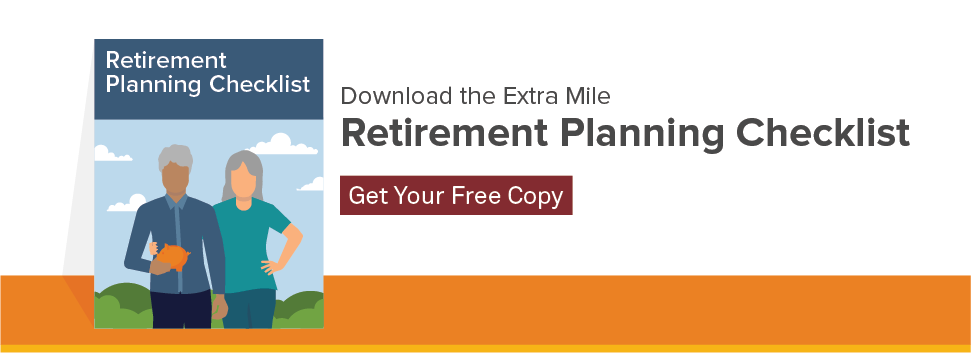As you near retirement, especially in the decade approaching the traditional retirement age of 65, retirement planning doesn’t slow or end. In fact, your retirement strategy may even accelerate.
Only 18% of Baby Boomers report being “very confident” of their ability to retire with a comfortable lifestyle, according to “What is ‘Retirement’? Three Generations Prepare for Older Age,” a 2019 survey of workers published by the Transamerica Center for Retirement Studies, a division of Transamerica Institute, a nonprofit, private foundation based in Los Angeles.
Did you know, however, that steps you take toward retirement planning during the 10 to 15 years leading up to your retirement goal date can increase retirement savings and even play a significant role in when you can expect to retire comfortably?
What Retirement Planning Includes
When it comes to your retirement checklist, the need for future income is an obvious focus, along with tax planning, healthcare needs, and legacy goals.

According to “Boomer Expectations for Retirement 2019,” the annual update report issued by the Insured Retirement Institute, an association for the retirement income industry headquartered in Washington, D.C., 77% of Baby Boomers who work with a financial advisor have a retirement income plan as part of their financial plan.
As they look toward retirement, these Boomers’ financial plans also include:
- Setting a retirement savings goal (69%)
- Determining the best Social Security claiming strategy (65%)
- Planning for healthcare expenses in retirement (48%), plus a plan to cover long-term care costs (41%)
- An estate plan (46%)
- Annuities (42%)
How Six Important Ages Can Affect Retirement Planning
While your individual retirement plan is unique to your goals and desired lifestyle, Americans share several key age-related dates to consider when planning for retirement.
Age 50
After you turn 50, you can begin making “catch-up contributions” to certain retirement accounts to increase savings as you near retirement.
The Internal Revenue Service (IRS) imposes the following limits on annual catch-up contribution amounts for 2019:
- Up to $6,000 to 401(k), 403(b), SARSEP, and governmental 457(b) retirement accounts, with the exception of a Savings Incentive Match Plan for Employees (SIMPLE) 401(k)
- Up to $3,000 to a SIMPLE IRA or a SIMPLE 401(k) plan
- Up to $1,000 to a traditional IRA or Roth IRA
Age 55
While 59½ is generally the age at which you can make withdrawals from a 401(k) without paying an extra 10% early distribution tax, there is an age-related “separation of service” exception to this rule, according to the IRS.

If you quit or lose your job in or after the year you turn 55 (or age 50 for certain public safety employees), withdrawals from some 401(k) plans may not be subject to the additional early distribution tax. This exception applies to only 401(k) plans, not to IRA or other retirement accounts.
Age 59½
Generally, the year you reach 59½ is when you can take distributions from 401(k), IRA, and other retirement accounts without paying the 10% early distribution penalty.
Ages 62-70
At age 62, you become eligible to start drawing Social Security retirement benefits, although, at that age, your monthly benefit amount will be reduced by as much as 30%. The eligible benefit amount increases each year until you begin taking Social Security retirement benefits, or until you reach age 70, whichever comes sooner.
You’ll receive a higher monthly benefit amount by waiting until your full retirement age. Your full retirement age for Social Security is between 66 and 67, depending on the year you were born. You also have the option to delay receiving Social Security retirement benefits past your full retirement age; the monthly benefits amount will increase until you begin receiving benefits or until you reach age 70.

Age 65
In the year you turn 65, you will need to sign up for Medicare, the government health insurance program for people 65 or older. If you plan to continue working after age 65 and are covered by a group insurance plan at work, you may want to speak with your benefits representative to see how signing up for Medicare could affect that coverage.
Age 70½
When you reach age 70½, the IRS requires you to start taking required minimum distributions from your traditional or Simplified Employee Pension (SEP) IRA, SIMPLE IRA, or retirement plan account, such as a 401(k) plan. (A Roth IRA does not have required minimum distributions during the original owner’s lifetime; however, an inherited Roth IRA may require minimum distributions.)
Tailoring Your Retirement Plan to Your Needs
As you plan for retirement, ask yourself these 10 important questions.
1
What would I like to do after I retire?
In the five to 10 years leading up to retirement, focus on what you want retirement to look like for yourself and your family, says Andy Panko, a Certified Financial Planner™ (CFP®) and owner of Tenon Financial, a retirement planning and investment management firm in Iselin, N.J.
For example, if you want to travel extensively once you retire, you’ll need more retirement savings than if you plan to work part-time and live a modest lifestyle. “Try to realistically estimate what your overall lifestyle and income needs will look like in retirement,” says Panko.
2
At what age do I plan to retire?
The age at which you plan to retire depends largely on your personal goals and retirement income sources, says Jim Holtzman, a CFP® at Legend Financial Advisors in Pittsburgh.
Holtzman looks at clients’ current annual expenses and withdrawal rates from investment assets such as 401(k), IRA, or other retirement accounts to gauge spending habits, which often carry over into retirement.
“If a client is already withdrawing more than 2% from retirement accounts, we talk about whether a client’s portfolio has an expected return to at least keep up with inflation and support the annual withdrawal rate,” says Holtzman. “If not, we may explore working longer or reducing expenses to achieve appropriate withdrawal rates so they don’t deplete retirement assets.”
If you plan to retire before (or your face an unexpected early retirement) you become Medicare-eligible at age 65 and won’t have health insurance from a former employer, be sure to factor in monthly health insurance premiums.
3
How will I collect income in retirement?
Some people retire completely, while others work part-time or pursue a new career. Regardless of your retirement plans, know how much income you will receive from a pension if you have one, Social Security benefits, and your retirement account assets.
“Don’t plan on working until you retire and then figuring it out,” says Panko. “Ask yourself if you will have the resources you’ll need and what adjustments you can make to save more, earn more, or invest more.”
4
How will I pay for long-term care in retirement?
Someone turning 65 today has a nearly 70% chance of needing some type of long-term care services in their lifetime, according to the U.S. Department of Health and Human Services.
The annual national median cost for an assisted living residence is more than $48,000, and the national median cost for a private room in a nursing home exceeds $102,000 annually, according to the 2019 Genworth Cost of Care Survey. Long-term care insurance is an option, but it can be cost-prohibitive, especially if you wait until age 60 or older to purchase it.
“Different people have different views on whether the cost of long-term care insurance is worth it,” says Panko. “Given the constantly increasing cost of insurance, there is definitely a case to be made for going the self-insured route.” Planning to use savings for long-term care costs is a gamble, however, one that can potentially drain retirement savings if you and/or a spouse end up needing long-term care for an extended period.
5
Where would I like to retire?
Around 69% of respondents in the Transamerica survey cited having an affordable cost of living as “very important” to decision-making about where to retire. Respondents also cited being close to family and friends (49%), enjoying good weather (45), and having a low crime rate (42%).
Other factors to consider include access to recreational and leisure activities, and to excellent healthcare services, including the costs of long-term care such as in-home care, assisted living, and nursing home costs, which vary greatly by city and state.
6
Do I need a debt payoff plan to meet my retirement goals?
Having a plan to eliminate high-interest debt and any remaining student loan debt well in advance of retirement is a priority. However, a mortgage may be a different matter.
“I’m not worried if a client has a mortgage in retirement as long as the withdrawal rate from retirement accounts works,” says Holtzman. “The situation is much different when the person doesn’t have enough in withdrawals and Social Security benefits to live on.”
Around 56% of Baby Boomers in the Transamerica survey cited paying off debt as a top financial priority. Credit card and other consumer debt and mortgages topped the list of debts to pay off, and 7% of Boomers reported still having student loan debt.

People ages 50 and older owed around 20% of America’s total $1.5 trillion in student loan debt as of December 2018, according to “The Student Loan Debt Threat: An Intergenerational Problem,” a 2019 report published by the AARP Public Policy Institute. In 2015, around 37% of student loan borrowers 65+ were in default, according to government data cited in the report.
Default can derail retirement goals, since the government may take an offset of up to 15% from your monthly Social Security check if you are in default on a student loan.
7
How can I benefit from tax planning?
Because lower income tax rates legislated by the 2017 Tax Cuts and Jobs Act will continue through tax year 2025, you may benefit from converting a tax-deferred retirement account such as a 401(k) or traditional IRA to a Roth IRA, says Panko. Keep in mind that you must pay income taxes when you convert tax-deferred funds and on future contributions to a Roth IRA.
“Once the money is in the account, funds will grow tax-free and typically also come out tax-free,” says Panko.”Contributing to a Roth IRA after you stop working but before you begin drawing Social Security benefits can be an ideal time, since you likely have minimal other taxable income during that period.”
8
Should I consider selling assets to add to retirement savings?
If you’re approaching retirement, especially within the next five years, and your retirement savings won’t support the retirement lifestyle you desire, you may be able to bolster your savings by selling a valuable asset.
“If a second home is adding to the amount you’ll need to withdraw annually from your retirement account[s] to the point where it’s becoming unhealthy, you could consider selling it,” says Holtzman. “The proceeds can be used to increase the investable asset base, reduce expenses, and lower the annual withdrawal rate.”
9
Is my estate plan up to date?
If you don’t have an estate plan, now is the time to create one for greater peace of mind in retirement. And it needs to address both financial and medical issues as you age.
If you already have an estate plan, review it with your attorney a year or two before you retire to ensure that all beneficiaries are correct and that medical and financial powers of attorney are in place, especially if you have remarried.
If you move to another state after retiring, you’ll need to review and/or change your estate plan once again to reflect your new resident status.
10
What are my next retirement planning steps?
Meet with your financial advisor to make sure you are on the right path toward your retirement goals and lifestyle, and adjust your retirement plan accordingly.
By staying on top of key retirement dates, you can take stock of your retirement plan well in advance of retirement. As a result, you will have a window of several years to make adjustments that can help you achieve your desired retirement lifestyle and goals.






